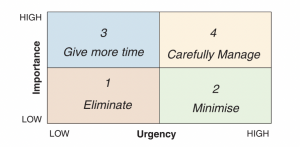So how can you do both? And do them both well? How can you work well and live well, all in accordance with your values and your priorities? The answer to that question is largely one of time management.
Whether it is you who need to work on your time management or you are trying to help a coaching client here is an exercise to help determine what needs to take priority.
Time Management: Plotting Priorities

The following exercise is adapted from the Resource Zone Time Management Skills Builder.
1. List it
List out all of your activities, projects, and commitments. Include everything that will take up your time: family, work, friends, volunteering, sports, hobbies. If it requires physical or mental effort or you spend time doing it—it needs to go on the list.
2. Label it
Label every single item on your list according to Low Urgency-Low Importance (1), Low Importance-High Urgency (2), Low Urgency-High Importance (3), High Importance-High Urgency (4).
3. Drop it in a Matrix
Okay, we’re not talking THE Matrix, but it is an incredibly helpful visual.
Start by creating a document with a 2×2 table. Place everything labeled with a (4) in the upper left box, (3) in the upper right box, (2) in the lower left box, and (1) in the lower right box.
4. Manage it
You have your priorities, the hard part is acting accordingly.
It may be that everything in the High Importance-High Urgency box (4) feels overwhelming—it may even be that these things became urgent because you backburnered them for too long and it’s nearing crisis mode. These are your top priorities and they need to be managed carefully.
Box (3) is tricky because the Low Urgency-High Importance list is filled with things that are important to you but, because they aren’t urgent, you may be neglecting them. These things require you to give more time to them so you can plan and do it well.
Your Low Importance-High Urgency list in the (2) box illustrates the tyranny of the urgent. The truth is, the lower importance illustrates that these aren’t as urgent as they demand is likely false. Everything in this box can be minimized or possibly even eliminated.
That brings you to the last box (1). Things that are Low Urgency-Low Importance are probably time suckers that take time away from what is really important to you. Consider eliminating the things in this box. How would you feel without this thing? How can you direct that time toward accomplishing what is more important to you? If you aren’t comfortable eliminating it, it is likely more important than you gave it credit for and should be moved to a different box.

There’s More to Time Management
A lot has been written on time management, and with good reason. It’s a hugely important skill set. How far would you get in coaching or running a church or ministry without it? And in all of those books there are plenty of great ideas and suggestions. But which ones will be the most helpful for YOU? Which best apply to your situation?
There’s a way to find out. We have a time management assessment profile that measures your effectiveness in seven different spheres:
- Predisposition: How much pressure do you feel or put on yourself?
- Preparation: To what extent is planning ahead an integral part of your time?
- Organizational Ability: How effectively do you control your time to achieve a good balance?
- Pressure Management: When others are in chaos around you, to what degree can you remain effective?
- Delegation Skills: How well do you spread your tasks or workload so you can manage it effectively?
- Interruption Management: How flexibly are you able to respond to unexpected events or interruptions?
- Results Orientation: How well do you distinguish between what is important and what is merely urgent?
You can see how someone may be strong in, say, Pressure Management, but not as strong in Preparation. Very few people are strong in all seven areas. The results of this Time Management Assessment tell you where to focus your efforts for maximum leverage and growth. Why guess when you can know? Why throw a dart in a general direction when you can aim it at a specific goal range?
Resources
Take the Time Management Profile today, and work with your coach on improving your effectiveness by focusing on the specific skills that you need. That way you know that the time and energy you’re expending are those that will get you the maximum results. How’s that for effective time management?
Once you have identified what areas need to be developed, the Time Management Skills Builder will help guide you toward growth. In fact, the Plotting Priorities exercise above is adapted from this Skills Builder–it’s a gem!
If you are working to help clients grow in time management, I recommend the Time Management Coaching Guide and Storyboard. It is a really powerful tool!
